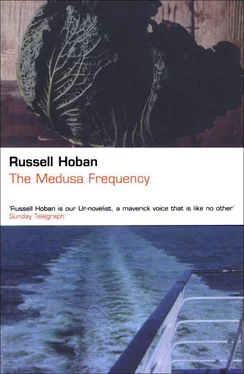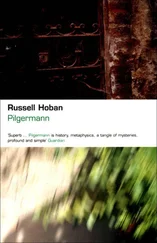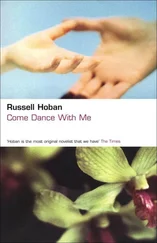‘Oh God,’ I said, ‘it just keeps going round in a circle.’
‘She never liked my singing,’ said the head, ‘I’ve told you that. Once she took the lyre out of my hands and said, “Love is its own music.” But that doesn’t really mean anything, does it? I mean, if music is what you do then that’s what you’ll do, isn’t it. Then she said to me, “You emptied the tortoise-shell for your music and now you’re emptying us.’”
‘Maybe it wasn’t only the music that was bothering her.’
‘You’re thinking of other women.’
‘Yes.’
‘I remember how their eyes shone in the firelight,’ said the head, ‘and beyond the firelight the wild beasts crouched and black trees nodded in the night. I remember the dawns when I found myself in strange places encircled by trees and stones and sleeping figures wet with dew. I remember the tops of the trees swaying in the dawn wind, how the night was still in them like a cat biting the neck of its mate.’
‘Groupies.’
‘I never said I was any better than anyone else,’ said the head.
‘And yet,’ I said, ‘I suppose the world-child is greedy for sweets as all children are.’
‘No, it isn’t. The world-child perceives the lover as the whole world, the world-child is greedy for the sea and the mountains and the death that live in that one person who is loved.’
‘I told you the first time we spoke’, I said, ‘that your morality might be too much for me.’
‘It’s too much for me as well,’ said the head. ‘My perceptions have always been beyond my capabilities.’
‘Then you accept that this world-child is some kind of an impossible ideal.’
‘Whatever it is,’ said the head, ‘it’s an idea that won’t let go of me.’
‘But you weren’t able to go on being the world-child,’ I said. ‘You lost it, and now you roam the world rotting and eyeless, telling your story to strangers like a drunk in a bar. Is this your punishment?’
‘Being Orpheus was my punishment.’
‘For what?’ I said.
‘For killing the tortoise.’
‘Can that one killing matter so much?’
‘Nothing matters more than anything else. Things arrange themselves in certain ways and it is left to us to make the connections.’
‘And what’s the connection between you and me? I know you’re the first of my line and all that but why are you telling me your story?’
‘I am that which responds,’ said the head, ‘I’ve told you that. You said yes three times and I was compelled to tell my story.’
‘Before I said yes three times you asked me three times if I wanted to hear the story.’
‘Well, it’s a story that wants to be told, isn’t it.’
‘And you made me take it on me that the story would be finished,’ I said. ‘Why did you do that?’
‘The story is different every time,’ said the head, ‘and every time there are difficulties — I always need help with it and I’m always afraid it won’t go all the way to the end.’
‘Different each time. How can that be?’
‘How can it not be? A story is a thing that changes as it finds new perceptions, new ideas.’
‘Fallok was trying to do it with music,’ I said. ‘How far did he get?’
‘Not very.’
‘What do you think my chances are?’
‘I don’t know,’ said the head, ‘but if you can’t do it there’ll be somebody else.’
‘You mean if we can’t do it.’
‘Yes of course. Didn’t I say we?’
‘No, you didn’t. Why do you have to keep going through the story over and over?’
‘It’s got to come out differently one day,’ said the head.
I looked away for a moment. When I looked back the head had become a football, one of those plastic ones they sell at Woolworth’s for three or four pounds.
‘Well, Herman,’ said Sol Mazzaroth, ‘here it is round about midnight.’ He hadn’t bothered to ring, he just jumped out of the telephone wearing red silk pyjamas and a black silk dressing-gown with a gold monogram and was pacing backwards and forwards through the clutter on my desk. ‘How’re we doing?’ he said. Pretending not to hear I stuffed him back into the receiver and took the phone off the hook.
Hello, said my current account. I was just passing by and I thought I’d look in. You keeping well? Everything all right?
You said I had no balls, I said.
You know I was just kidding around, said the current account. I didn’t mean anything by it. What are you doing, where are you going?
But I’d already jumped into the telephone and hurled myself through the circuits to Sol Mazzaroth asleep in his red silk pyjamas which were monogrammed the same as his dressing-gown. I shook him roughly, averting my eyes discreetly from whoever else was in the bed.
‘Herman!’ he said. ‘What time is it?’
‘Three o’clock in the morning.’
‘What’s happening?’
‘I’m not going to do it.’
‘Why not?’
‘Orpheus wouldn’t like it.’
‘Herman, with respect, Orpheus was a wonderful musician but I doubt that he knew anything about magazine publishing. Stay with it and I’ll talk to you a little later in the morning, OK?’
‘Sol, I’m sorry but it’s not on. I really am not going to do it.’
‘Herman, you say you can’t do it but you still haven’t given me a reason I can understand.’
‘I can’t do it because it’s got to come out differently one day.’
‘That doesn’t make sense.’
‘It does to me.’ Through the dark and murmuring circuits I made my way back to my place. The current account lay dead on the floor, a thin trickle of blood coming from its mouth. From over the mantel the Vermeer girl smiled down on me.
Herman, she said, you’re a hell of a guy.
I went to bed and the next thing I knew I was awake again and it was getting on for ten o’clock in the morning. Ring, ring, said the telephone, ring ring. Seize him.
‘I’m right here,’ I said. ‘I’m tired of running. Here I stand.’
‘I have a call for you from Sol Mazzaroth,’ said Lucretia.
‘Yes,’ I said, ‘bring forth Mazzaroth in his season.’
Sol stepped out of the telephone and looked at me in disbelief. ‘Herman,’ he said, ‘was it a bad dream or did you actually phone me at three o’clock this morning and say you couldn’t do it?’
‘Yes, it was a bad dream and that’s what I said.’
‘But why, Herman? Surely you’ve done tougher adaptations for me: look at War and Peace, how you got through it in twenty-five pages, I still tell people about that.’
‘I know, Sol. This is just one of those times when something that was whatever it was becomes something else and all of a sudden it’s too much.’
‘Herman, when I think of what we’ve been through together since the old Hermes Foot Powder days I can’t believe this is happening. Together we built Classic Comics and made it a beacon of literacy at newsagents everywhere. John Buchan, Dostoevsky, Victor Hugo — you name it, we put it in speech balloons.’
‘Believe me, Sol, I’m grateful for everything you’ve done for me. If it weren’t for you I’d still have to bath and shave and go to an office every morning if I could find an office to go to.’
‘And you’re going to throw it all away.’
‘You know how it is,’ I said. ‘There comes a time when a road comes to an end and you have to say, “This is the end of the road.’”
‘But it’s not the end of our friendship,’ he said.
‘Of course not.’ We both looked at our watches.
‘Well, it’s going to be a more hectic day than usual. Take care, Herman.’
Читать дальше












